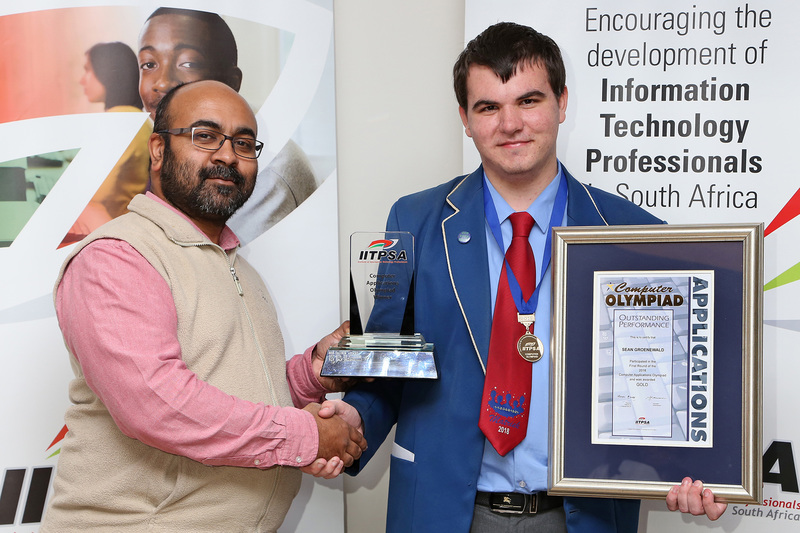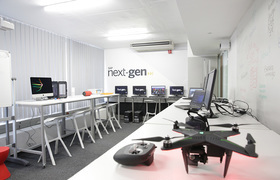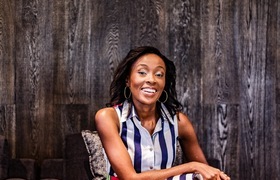Computer win ups odds for coveted scholarship
14 August 2018 | Story Kim Cloete. Photo South African Computer Olympiad. Read time 6 min.
Hoërskool Randburg matric learner Sean Groenewald has made himself eligible for a coveted first-year Vice-Chancellor’s scholarship to study at the University of Cape Town (UCT) by winning the hotly contested Computer Applications Olympiad.
The Olympiad finals, held in Cape Town during the winter school holidays, test technical ability with documents, spreadsheets and databases, as covered by the school subject Computer Applications Technology (CAT). The finalists had to show their creativity with data by anticipating problems, spotting trends and imagining possible solutions.
The12 top performers, from 5 226 initial participants, were selected after the second round of the competition during which they had to answer 25 questions online in 60 minutes, based on a spreadsheet, database and Word documents.
“They had to apply their thinking strategy,” said manager of the South African Computer Olympiad Michael Cameron.
“Sometimes there are at least four methods of finding out the same answer. You need to know how to mine the information to provide outstanding results.”
‘Extremely proud’
A massive data set was used in the four-hour finals round. It was based on hundreds of thousands of anonymised records from a decade of the Cape Town Cycle Tour.
The high-school finalists not only analysed the data but also responded to a trend it revealed about entries from young people. They had to illustrate the trend in an informative graphic that would attract more teenagers to participate in the cycling event.
Groenewald said he was “extremely proud” to claim the gold medal and that it was very exciting to consider studying in such a dynamic field.
“I think a double major in mathematics and computer science will stand me in good stead in future.”
“The information technology (IT) field is growing every day. Artificial intelligence is the future. I think a double major in mathematics and computer science will stand me in good stead in future.”
Groenewald, who started playing computer games at the age of four and was a finalist in the Programming Olympiad in 2017, won R4 000 for himself and R3 000 for his school in the Applications Olympiad. As the gold medal winner, he is also eligible for a first-year scholarship to study at UCT next year.
A fellow Hoërskool Randburg learner, Shan O’Neil, won a silver medal, with a second silver medal going to Daniel Olivier from Paul Roos Gymnasium in Stellenbosch.
Mastering vital skills
“The finals were whittled down from a very broad competition in schools throughout the nine provinces. It was extremely competitive,” said Associate Professor James Gain, deputy dean in UCT’s Faculty of Science.
Gain, who is on the board of the Computer Olympiad, said encouraging the mastering of computing and technology was vital in an ever-changing world.
“The world is crying out for people with these kinds of skills. We will be relying on technology in a massive way going forward. There are also so many opportunities for the betterment of society through technology.”
“The world is crying out for people with these kinds of skills.”
He said there was a huge demand for people with computer science and applications skills, ranging from working for the big tech companies like Google, Amazon and Apple, to banking and doing application development for cellphones.
“Often graduates get two to four job offers. They can pick and choose.”
Different paths
UCT offers tremendous opportunities for students wanting to pursue careers in both computer science and information systems, said Professor Ulrike Rivett, director of UCT’s School of IT.
“The IT sector is by far the fastest growing sector globally. IT is part of every industry, every profession and every government department. There is no degree that does not require engagement with computers – but we need more people who see IT as central to their life.”
Prospective students can follow different paths at UCT.
“People who see themselves going into the computer environment, where software development is core, would do a computer science degree and could move into the big and small software houses in South Africa and the international world.
“Students who like IT, but would prefer to use it in the context of the commercial sector, would study a BCom Information Systems with the possibility of a double major with computer science or a BBusSc Information Systems,” said Rivett.
Another exciting option for students who may not have the necessary science or maths from school is to pursue a BA Informatics, through the Humanities faculty, with a major in information systems.
“This is a particularly great opportunity for students who enjoy the engagement with the digital world within the context of the humanities,” she said.
“We would love to see more students applying for our IT degrees since we need far more people who can design the next Uber app, the next online banking tool, the next digital learning platform and the next Twitter.”
 This work is licensed under a Creative Commons Attribution-NoDerivatives 4.0 International License.
This work is licensed under a Creative Commons Attribution-NoDerivatives 4.0 International License.
Please view the republishing articles page for more information.










